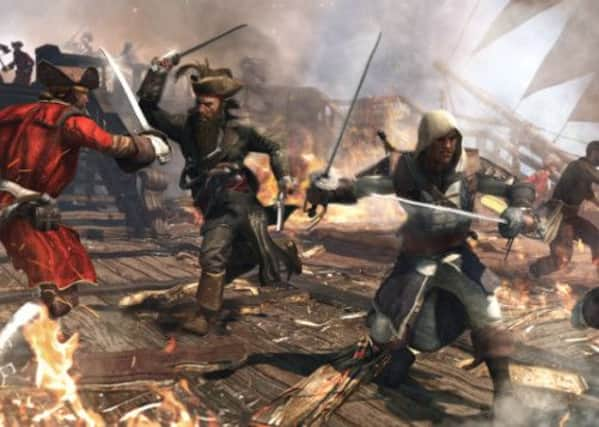Scotsman Games review: Assassin’s Creed IV


Assassin’s Creed IV Black Flag - Xbox 360 (reviewed) / Playstation 3 / Wii U / PC / Xbox One / Playstation 4
Score: 8.5 / 10
An expansive premise revolving around a chrononaut’s adventures has been the series’ greatest virtue, enabling the developers to call upon a near inexhaustible stockpile of locales and sculpt dramatic playpens of verticality from Florentine architecture, actualising historical periods long deemed an incongruous fit by an industry obsessed by the future.
SCOTSMAN GAMES REVIEWS
Advertisement
Hide AdAdvertisement
Hide AdThe sweeping scale of the core narrative concept, however, has frequently saddled the games with muddled storylines and disparate gameplay elements, such as the ill-conceived tower defence minigame that plagued Revelations, the fourth instalment of the six main entries in the canon to date (a number that swells to 16 if mobile, handheld and browser iterations are included). The latest, Black Flag, is the outcast of the series; whether you judge that to be a good thing or not depends largely on how much emphasis you place on the story, for it does not merely fail to advance the ancestral legend, it treats it with contempt.
The game’s buccaneer protagonist, Edward Kenway is entirely unconcerned with the battle between the Assassins and the Knights Templar. Amassing treasure and riches is his sole motivation, and the convoluted historic rivalry that has underpinned the series seems like a mere afterthought, and both sides are there to be played off one another in the pursuit of wealth. After years of carefully cultivating the motivations and nuances of both factions, the new iteration of series puts them firmly in the background; in Kenway’s world, the piratical code rules.
This shift manifests itself on the open seas of the Caribbean, where the ocean becomes a sprawling open world waiting to plundered and ruled by Kenway and his vessel, the Jackdaw. It is a riveting twist upon the formula, lending it a welcome freedom and bombast. The deep blue is introduced early in in dramatic fashion as Kenway and his makeshift crew escape an enemy fleet and a perilous thunderstorm. Once at safety, the action is anything but covert as you venture between archipelagos in search of treasure, hunt whales and sharks, or orchestrate takeovers of other vessels, storming them en masse and wresting control by force.
The experience is superbly detailed, building significantly on the naval battles introduced in Assassin’s Creed III. Your lusty crew hollers out ribald sea shanties as the Jackdaw’s groaning bow scythes satisfyingly through the ocean waves. The pirate theme - one curiously underutilised in gaming until now, although the success of Black Flag will likely inspire a slew of imitations in six months’ time - is evocatively realised to the extent that you can almost smell the cocktail of salt air, dark rum and gangrene.
At land, the purity of the parkour mechanics is present and correct. Black Flag lacks the sprawling urban realms of previous games, but the design of locations such as Kingston, Havana and Nassau are nonetheless disciplined and thoughtful, allowing for the kind of intuitive rooftop play that is a staple of the series. The graphics, even on the current generation of consoles, are excellent, and although the cities featured are compact, they are beautifully represented.
There are, however, aspects of the game that feel like a concession to other ever-present features of the Assassin’s Creed games that, unlike the parkour, have been included not on their own merits, but because of canonical expectations. The covert monotony of chase missions and eavesdropping, for example, feel cumbersome and dated, particularly when they follow the thrillseeking abandon of the seafaring sections. An intrinsic part of progressing a series is knowing which elements to jettison, but there is a nagging sense that Ubisoft feels duty-bound to shoehorn everything in the one package in the belief that is offers value.
Similarly, the title suffers during the distinctly meta present day cutaways set in Abstergo Entertainment, a games development division. Assassin’s Creed is a series renowned for its ephemeral distractions, such as side quests and collectible challenges - plenty of which are to be found - but Ubisoft’s clumsy self satire in this regard is a step too far, an indulgence that should have been cut after the QA work was completed.
Advertisement
Hide AdAdvertisement
Hide AdBlack Flag, then, is a game of a swashbuckling reinvention, albeit one that only goes so far in leading some of the more anachronistic aspects of the series down the gangplank. At its best, it is not merely a return to form for Ubisoft, but something new entirely. The sea air and Caribbean spice has clearly had a reinvigorating effect on the studio, and those gamers who feel the franchise has lost its way should know that, the majestic Assassin’s Creed II aside, this is its best offering to date.